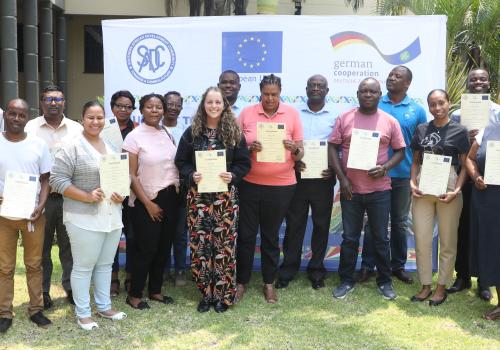A total of 12 representatives of companies involved in the manufacture of anti-retroviral drugs (ARVs) participated in a training workshop on Intellectual Property Rights for Companies in the ARV value chain organised by the Southern African Development Community (SADC) in partnership with the African Regional Intellectual Property Oganisation (ARIPO) in Harare, Zimbabwe from 13th to 15th October 2022.
The participants from Botswana, Malawi, Mauritius, Mozambique, South Africa, and Zambia, Zimbabwe attended the capacity building training workshop aimed at strengthening regional and national Intellectual Property Rights Policies and Regulations (IPRs) and Trade Related Intellectual Property Aspects of Intellectual Property Rights (TRIPS) compliance.
Professor Michael Blakeney of the University of Western Australia, the lead consultant for the training in partnership with experts from ARIPO, conducted the training and topics covered included Introduction to Intellectual Property Concepts and Principles; Patenting and Generics; Pharmaceutical Patenting and SMEs; Intellectual Property Rights, Market Competition and Access to Affordable Medicines; Enforcement of IPRs in the ARV Sector; and Protection of Traditional Medicines and Knowledge.
The training raised awareness of IPRs among the participants from the ARV sector in the SADC Region who learnt about patents on ARVs; availability of patented ARVs; patents and fixed dose combinations; licensing; costs of generics; medicines patent pool; compulsory licensing of patents; TRIPS waiver; TRIPS flexibilities; procurement of ARVs in SADC; and competition controls.
According to ARIPO Intellectual Property is a very wide field of law that affects human kind in all daily activities in the consumption of products and services and it is comprised of three components, namely industrial property; copyright and related rights; as well as emerging issues of Intellectual Property. This can be an invention (patent/utility model), a design (industrial design), a brand name (trademark), or a literary and artistic work (copyright). Intellectual property protection is critical to fostering innovation. Without protection of ideas, businesses and individuals would not reap the full benefits of their inventions and innovations and would focus less on research and development.
At the end of the training workshop, which was convened by the SADC Secretariat under the Support to the Industrialisation and Productive Sectors (SIPS) programme, the participants were presented with certificates at a brief ceremony at ARIPO head office in Harare, Zimbabwe.
SIPS is a programme funded by the European Union (EU) and the Federal Ministry for Economic Cooperation and Development (BMZ). SIPS aims to enhance the regional policy and regulatory environment and also private sector participation in regional value chains.
The objective of SIPS is to contribute to the SADC industrialisation and regional integration agenda by improving the performance and growth of selected regional value chains as well as the related services within the agro-processing and pharmaceutical sectors.
SADC oversees enhanced policy, regulatory and business environment on national and regional levels for development and sustainable operation of the regional value chains for selected products in the agro-processing and pharmaceutical sectors, while the German development agency, Deutsche Gesellschaft für Internationale Zusammenarbeit (GIZ), a key implementer of SIPS, coordinates the enhance participation of the private sector in the ARV, CMPP and leather value chains under Result Area 2.
Result Area 1, which is implemented by the SADC Secretariat, seeks to enhance the policy, regulatory and business environment at national and regional levels for the development and sustainable operation of regional value chains in the agro-processing and pharmaceutical sectors.

